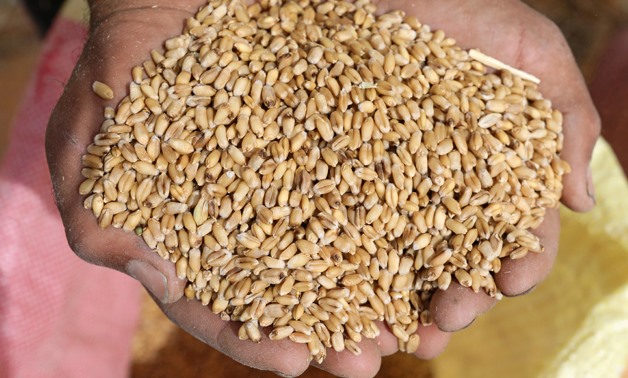
FILE PHOTO: A farmer displays wheat grains at a field in the Beheira Governorate, Egypt May 3, 2018. REUTERS/Mohamed Abd El Ghany/File Photo
CAIRO - 13 October 2022: Minister of Finance, Mohamed Maait, stressed the need to create a flexible mechanism for the exchange of basic commodities between the countries of the African continent, especially wheat and fertilizers, in a way that helps in maximizing the capabilities of African economies.
This came during his meeting with his African counterparts, in the presence of the International Monetary Fund and the United Nations Economic Commission for Africa, on the sidelines of his participation in the IMF and World Bank meetings in Washington.
“Expanding the volume of intra-regional trade and improving the competitiveness of the economies of the continent’s countries will ensure their cohesion and resilience in the face of various crises,” Maait said.
He added that it is necessary to form a mechanism for African supply chains to make the continent a food basket that exports its products to all countries of the world, stressing the need to achieve African food security, which has become an urgent continental priority, requiring optimal utilization of available continental resources, and the expansion of agricultural and industrial production.
“Emerging economies and developing countries are the most affected by the war in Europe, and its repercussions are very complex,” said the Finance Minister.
He added that the successive crises, starting from the Corona pandemic to the Ukrainian crisis, have caused a sharp global inflationary wave, which led to an increase in the prices of basic commodities and fuel as a result of the disruption of supply and supply chains and raising financing costs, in a way that is reflected in the reduction of comprehensive and sustainable development efforts internationally in various countries.
"This requires exchanging ideas, visions and experiences to reach flexible solutions to diversify sources of financing, and attract more investments to advance production and achieve economic and development goals in African countries,” he noted.
He stressed the need to intensify international cooperation efforts in order to help developing and African countries and emerging economies to reduce debt burdens and the cost of servicing them, and to provide appropriate financing opportunities, in addition to encouraging initiatives to exchange debts owed by those countries with rapid and multilateral implementation mechanisms to direct them to sustainability projects.

Comments
Leave a Comment